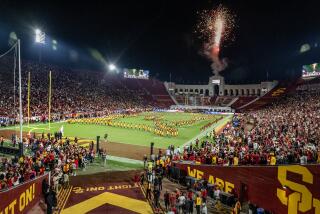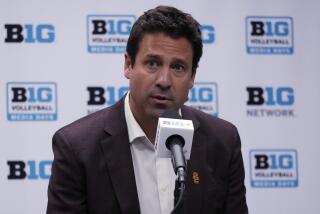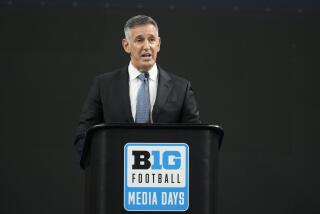Paterno Sizes Up Big Ten
- Share via
COLUMBUS, Ohio — When Joe Paterno first heard that Penn State would be joining the Big Ten, he told his athletic director, “You’re kidding.”
He wasn’t.
Penn State has been accepted into the Big Ten, and Paterno feels that the Nittany Lions’ admission will benefit both the conference and his university, despite creating numerous problems for both sides.
“I’ve been concerned from day one whether this is going to be good for Penn State,” he said Wednesday. “It’s not a question of whether it is just good for Penn State football. I’ve always been a company man and if the president says it’s good for the university, then it’s going to be good for our program.”
Many Big Ten athletic directors and coaches are upset about the additional costs of travel to Penn State, located in State College, Pa. Several also are unhappy with problems in scheduling and the potential for diminished funds for sports other than men’s football and basketball.
Paterno isn’t unsympathetic.
“I think if I had to be in (the administrators’) shoes, I’d want to know a little about how do you get there and how do you get back,” Paterno said. “But there are a lot of misconceptions about how to get to Penn State.”
He said the local airport, only 4 1/4 miles from campus, could handle most team flights.
Paterno, who will enter his 25th season as coach of the Nittany Lions this fall, also feels Penn State will be competitive in most sports -- not only football.
He said the men’s basketball team -- maligned by several Big Ten athletic directors and coaches as not being up to par in the conference -- has improved dramatically in recent years, advancing to the NIT’s Final Four this year.
But Paterno has heard the grousing, and not only from Big Ten representatives. Not everyone in State College is thrilled, either.
“A lot of (Penn State) people strictly interested in the football program were very concerned about us giving up our independent status. It’s been good to us in football,” Paterno said. “But I think those people are being short-sighted.”
Paterno said universities committed to staying away from recruiting violations and an overemphasis on athletics need to band together.
“If the Big Ten wants to do some things a certain way, then it needs to be strong enough to not have to worry about not playing people who are not of the same frame of mind,” he said.
Paterno said the move to so-called super-conferences -- combining parts of the major-college leagues now in existence to make even more powerful entities -- could lead to a national championship game.
“For me, having a lineup of six or seven conferences, I think you’ll have a national championship playoff,” said Paterno, who said the current bowl situation was deteriorating. “You could play 11 (regular-season) games to determine a Sweet 16 ... We’re talking (a maximum of) 15 games.”
Paterno said one of the bittersweet aspects of the move might be the end of traditional rivalries with Pitt and West Virginia. The Big Ten’s minimum of eight conference games will limit the number of non-conference opponents.
“The world’s changing. We’re moving on,” Paterno said. “I think it would be naive to think that the traditions we’ve had -- the games we’ve had -- wouldn’t change.”
Full participation in all sports will not occur for several years, but Paterno said it is one of his goals to be on the sidelines when the Nittany Lions play their first Big Ten football game.
“I want to coach in the Big Ten,” he said. “I’m going to coach until I’m 70 and I’m 63 right now. I’m excited about the opportunity to coach against some of the schools in the Big Ten. And I would love to have the opportunity to coach in a Rose Bowl.”
More to Read
Go beyond the scoreboard
Get the latest on L.A.'s teams in the daily Sports Report newsletter.
You may occasionally receive promotional content from the Los Angeles Times.










